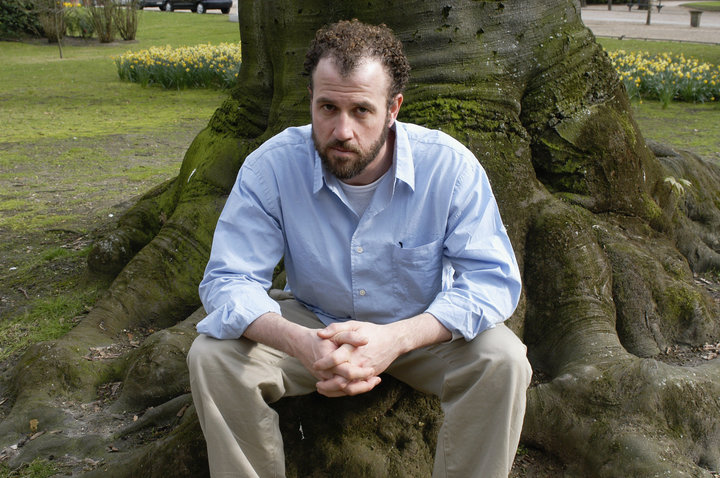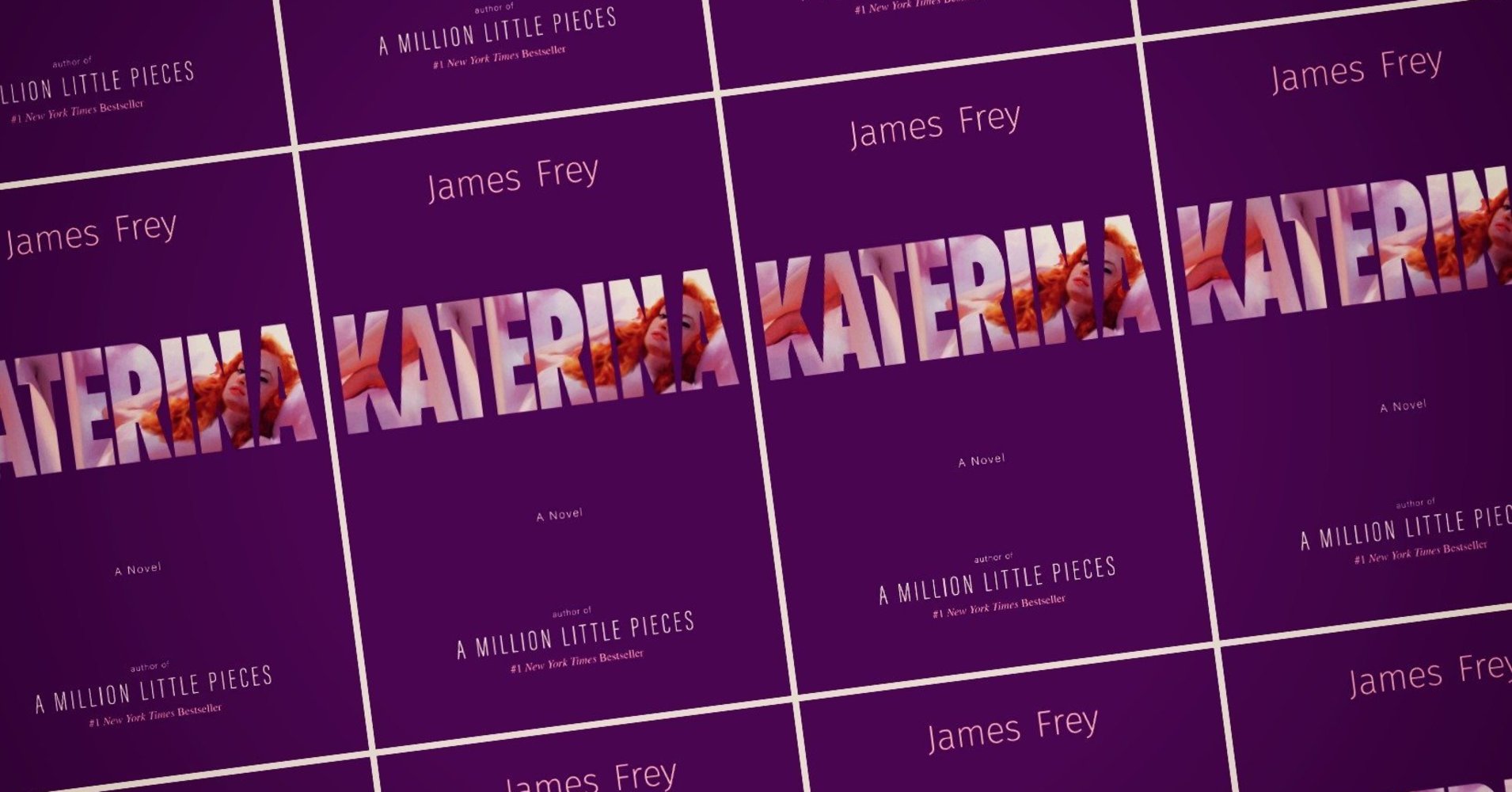[ad_1]
Why do we continually give second, third ― seemingly infinite ― chances to brilliant men who have done wrong? This is a good, necessary question; it’s a question that is front of mind for many in the cultural space lately.
But that is not the question that came to mind after I finished Katerina, the latest novel by noted literary hoaxer James Frey. The question that came to mind was, why do we keep giving all those extra chances to less-than-mediocre men?
It’s been 15 years since the publication of Frey’s debut, uh, let’s call it a “prose narrative work.” Billed as a shocking addiction memoir, A Million Little Pieces supposedly documented his own drug- and alcohol-fueled nadir, and his agonizing journey through recovery. He flogged the book on “Oprah” in 2005; immediately, it became a bestseller.
In early 2006, The Smoking Gun published a damning report revealing that many particularly gruesome details of the memoir and its sequel, My Friend Leonard, had been fabricated, including a violent clash with the police, a three-month prison stint and his scapegoating by the cops for the death of a classmate in a car accident. The motive was clear: In early press for the book, Frey had already admitted that the manuscript had initially been shopped as a novel, but turned down 17 times. (Apparently a gritty, true-life memoir held more commercial appeal.)
Now it’s 2018, and a film adaptation of “A Million Little Pieces” is finally showing at the Toronto International Film Festival; meanwhile, he has a new novel-from-life out (appropriately labeled this time). In Katerina, a tale of the narrator’s year as an alcoholic young writer in Paris is intertwined with a present day in which he opens up about how his life has been changed by success, fortune, marriage ― oh, and being outed as a literary hoaxer. His authorial rock bottom, A Million Little Pieces, is splashed on the cover; the flap copy promises that Katerina “echoes and complements” his debut and features the same “percussive, propulsive, dazzling, breathtaking style.”
Proving definitively that I am, deep down, an optimist, I decided that I was ready to give Frey a chance to percuss, propel and dazzle me, and maybe even take my breath away.
I was a high school kid in the heyday of A Million Little Pieces and never read it; I was familiar only with the taint that clung to its reputation. Maybe that was unfair of me, I thought. Since 2006, the novel-from-life has become not merely a staple of literary publishing but one of the most prominent genres (think Karl Ove Knausgaard and Sheila Heti); Frey’s casual dismissal of genre restrictions as irrelevant to the work itself seems almost prescient. Isn’t his art what matters?
Let’s posit, for the moment, that his art is all that matters, that Katerina exists as a pure work of literary creation and should be evaluated only on its creativity, style and narrative power. If that’s the case, Frey’s in trouble. The book sucks.
Katerina is the novel any weedy college bro high on Henry Miller and the Beat poets would write if he kept banging away at his vintage Olivetti long enough: hysterically emotive, narratively pedestrian, exhilarated by its own borrowed style. These novels typically don’t get published. But thanks to his reputation, Frey’s sophomoric schlock wasn’t dropped to the bottom of the slush pile. It’s been presented to us ― in royal purple hardcover and an inside dust jacket festooned with a painting of a naked woman ― as a work of a misunderstood literary genius.
Katerina opens in 2017, when our narrator, Jay, is a successful and happily married but artistically thwarted 40-something writer in Los Angeles. He starts getting mysterious messages from someone in his past on Facebook, and they strike up a conversation. Meanwhile, he flashes back to his time in Paris 25 years ago, when he was a young college drop-out with a severe alcohol addiction and a throbbing conviction in his nascent genius. This ’90s flashback takes up the bulk of the book, as he wanders Paris visiting museums, eating baguettes, having sex, blacking out and falling in love with a Norwegian model named Katerina. (It’s quickly understood that she is his enigmatic Facebook correspondent.)
Katerina has long reddish hair, brown eyes and a slender frame. She likes books and art and cocaine. For some reason (maybe that last thing), she’s drawn to Jay, an unoriginal Hemingway wannabe who routinely passes out in public alleyways and wakes up smelling like fetid trash. This plot reeks of wish-fulfillment ― the gorgeous, desirable model; their charmed love story; her candle held for him decades later; his destiny as the one writer in his generation who would, as he puts it, “burn the fucking world down.”
A doomed romance can certainly be compelling, with the aid of fresh language or lively characters. But Katerina wafts through the novel as little more than a sexy red pout atop two long shapely gams, and the narrator, while enraptured by his own navel, never manages to describe that navel, or the affair, with anything approaching insight or originality.
Occasionally, Jay meditates on his craft ― which, by extension, is Frey’s craft, as a meta twist at the end makes clear that Jay is writing a book, and, get this, it’s this book. He’s inspired by writers like Allen Ginsberg, Charles Bukowski, Jack Kerouac, Henry Miller and Victor Hugo (I know), but really models himself after visual artists like Auguste Rodin: just one exposed, beating heart, using the medium at hand to translate its soul vision into art.

Ulf Andersen via Getty Images
“There are rules with books. What something is called, how it is read, rules of grammar and punctuation,” he writes. “I go to art when I think about how I want to write books. There are no rules in art. No governance.”
In practice, this means that he incorrectly deploys commas and, when in the heights of poetic rapture, eschews sentence subjects.
Here’s how he describes a romantic getaway: “Go for walks in town through vineyards along roads long simple walks in the countryside sometimes we hold hands it’s warm and simple and calming and right, sometimes we bump hips and shoulders it’s playful and flirty and cute and right, sometimes we talk we have long conversations about books or art or how to live or why to live they’re intense and passionate and thought-provoking and right every minute every hour every day we spend together is right, right, right.”
Aside from the paucity of commas, a stylistic quirk he appears convinced he has invented in a flash of mad crazy wild genius — no I said no I won’t No — Frey’s language is broad, nonspecific and obvious. His favorite words include classics like “fuck,” “life,” “crazy,” “pain,” “sex,” “art” and “love,” and he’s unafraid to reuse them, often many times on the same page.
On love, he meditates, “I dream of crazy crazy mad love the kind that starts with a look, with eyes that meet, a smile, a touch, a laugh, a kiss. The kind of love that hurts and makes you love the pain, makes you want the pain, makes you yearn for the fucking pain, keeps you awake until the sun rises, stirs you while you’re still asleep.”
This continues for over a page in very much the same vein. It’s as though Frey can’t think of any fresh ways to say or describe things, so he resorts to repeating his words, hoping the repetition will stand in for throbbing inspiration.
When he does aim for metaphor or simile, he’s so proud of the result that he repeats those as well, even if they’re incoherent, trite or both. Katerina is described, page after page, as having “thick pouty lips like cherry pie” and “brown eyes the color of cocoa,” though cherry pie isn’t pouty and cocoa can present in any number of shades of brown. By the fifth time these similes showed up, I began to envision a woman with a face like a gooey dessert plate; this image temporarily salvaged my flagging interest.
The star of nearly every page, though, is Jay’s cock. The fucking is relentless, but, as in “Fifty Shades of Grey,” the result is more banal than titillating or revelatory. Everything is “hard” and “wet” and “deep.” I’ve read literary sex scenes, and I’ve read erotic sex scenes; I have never read a book that devoted so many pages to sex scenes that could have been composed by transcribing dirty talk from porn. His one innovation is to describe coming as “white,” e.g.: “I’m hard and it’s wet and the world goes white white white…. We fuck on top of her covers white white white God we fuck again under her covers white white white God we fall asleep when I wake up the next morning she’s gone.” Maybe this is how sex really feels for straight cis men, but it certainly didn’t evoke much for me.
By halfway through Katerina, I had run out of words with which to heckle it in the margins. I had begun to scribble emojis in pencil, like ? and ?. Suddenly, I related to Frey. It’s a frustrating thing to be a writer but lack the tools to express oneself in writing.
And Jay’s ambitions for his writing, which seem to mirror Frey’s, are immense: He wants to upend the way people read and write literature. In his early screed on making art, he notes, “When I look at art I don’t have to consider whether the work of art is fiction or nonfiction, whether it is a genre painting or literary painting, whether it is serious or commercial…. I want to make books in the same manner.”
Yes, as you may have gathered, Katerina is also Frey’s bid to relitigate his Million Little Pieces blooper. At one point he has 40-something Jay tell the story of an identical scandal he went through in a FB chat with Katerina, who wants to finally hear his side. It’s self-justifying, mealy-mouthed bullshit, but nothing new. Frey is a poor lawyer for himself; all the arguments I’d made to myself about the inadequacy of fiction vs. nonfiction as categories, the unreliability of all human narration, and the culpability of his publisher and book publishing under capitalism sounded instantly anemic and petulant in his own words.
Frey’s career arc is almost inconceivable for anyone but a white man: He (with a huge assist from his publisher) scammed his way into mega-success by lying to capitalize on demand for honest, inspiring addiction-recovery memoirs. By the time he was exposed, Frey was already a big-shot author, with a sequel out and a movie deal. And despite the ensuing embarrassment ― and earning the enduring enmity of perhaps the most powerful woman in the country, Oprah Winfrey ― he continued to do just fine. If anything, his notoriety solidified his selling power. In 2007, he landed a three-book deal with HarperCollins, which published his next novel, Bright Shiny Morning. In 2014, he signed a $2 million film and book contract for a young adult series that, many critics noted, had a premise familiar to anyone who has read or seen The Hunger Games. (His name, on the cover, dwarfs that of co-author Nils Johnson-Shelton.)
A Million Little Pieces was rejected nearly 20 times as a work of fiction. Now, sure, publishers pass on great books all the time. Maybe they were wrong. Maybe it was worth publishing as a piece of art, not just as an inspiring story of a real man’s recovery. But after reading Katerina, I doubt it.
[ad_2]
Source link

